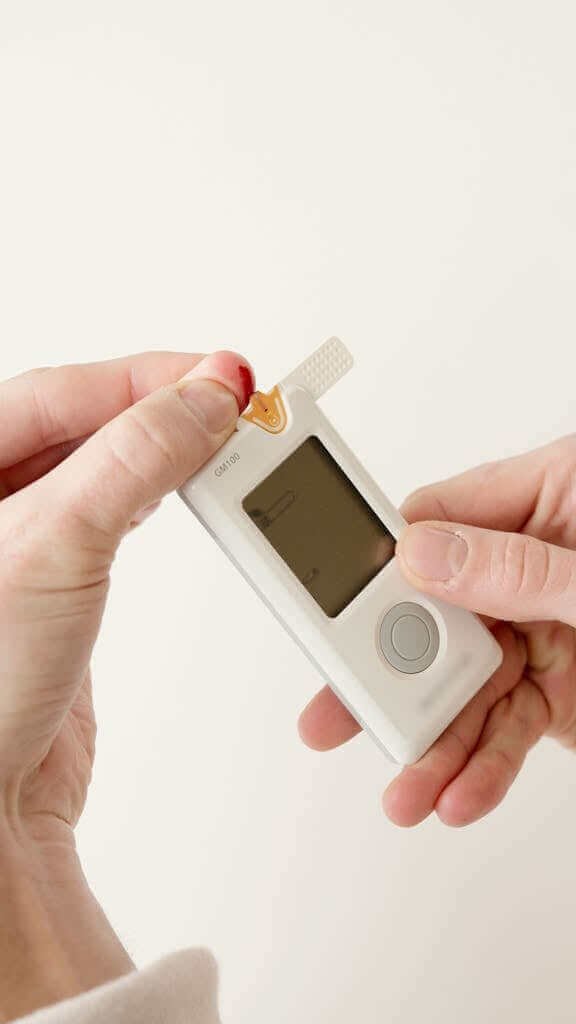Skinny Genes Big Risks: Managing Diabetes in Slim Individuals
Have you ever considered that being slim might not protect you from the risks of diabetes?
The notion that only overweight individuals are at risk for diabetes is being challenged by recent research.
Understanding how genetics play a crucial role in diabetes development, especially in slim individuals, can shed light on the complexities of managing this condition.
Stay tuned to uncover the surprising factors that influence diabetes management in slim individuals and the strategies that can help navigate these challenges effectively.
Slim Doesn't Equal Immune
Navigating diabetes when you're slim requires vigilance and tailored management strategies. Just because you may not carry extra weight doesn't mean you're immune to the risks associated with diabetes. It's essential to understand that being thin doesn't guarantee protection against the disease. Your body's metabolism, insulin sensitivity, and genetic predisposition all play crucial roles in how diabetes may affect you, regardless of your size.
Maintaining a healthy lifestyle is key for managing diabetes, even if you're slim. Regular exercise and a balanced diet are fundamental components of your diabetes management plan. Monitoring your blood sugar levels consistently and staying in touch with your healthcare provider are vital steps in staying ahead of the disease.
Genetic Predisposition Matters
You need to understand that genetic predisposition plays a significant role in diabetes management, even for those who are slim. Your family history and genetic makeup can impact your risk of developing diabetes, so it's crucial to consider these factors when managing the condition.
Being slim doesn't exempt you from the potential influence of genetic factors in diabetes, highlighting the importance of personalized care based on individual risk factors.
Genetic Influence on Diabetes
Understanding the genetic influence on diabetes is crucial in recognizing the role of genetic predisposition in the development of the condition. Your genes play a significant role in determining your risk of developing diabetes.
Certain genetic variations can increase your susceptibility to diabetes, even if you're slim. These genes can affect how your body processes glucose and insulin, leading to potential imbalances that contribute to diabetes.
It's essential to be aware of your family history of diabetes and discuss this with your healthcare provider. By understanding your genetic predisposition to diabetes, you can take proactive steps to manage your health effectively.
Slim Body Diabetes
With a slim body, understanding the genetic predisposition to diabetes becomes even more crucial in managing your health effectively.
While you may not exhibit typical risk factors associated with diabetes, such as being overweight, your genetic makeup can still play a significant role in your susceptibility to the disease.
It's essential to recognize that even slim individuals can have a genetic predisposition to diabetes, which may manifest later in life.
Regular monitoring of blood sugar levels and maintaining a healthy lifestyle are key components in managing your risk.
Risk Factors Consideration
Considering genetic predisposition as a crucial factor in evaluating diabetes risk can provide valuable insights for proactive health management. While being slim may lower your overall risk, understanding your genetic background is essential. If you have a family history of diabetes, especially in close relatives like parents or siblings, your risk increases.
Genetic factors can influence how your body processes sugar and insulin, impacting your susceptibility to developing diabetes even if you maintain a healthy weight. Regular screenings and monitoring can help catch any signs of diabetes early on, allowing for timely intervention.
Lifestyle Impact on Diabetes
You need to pay close attention to your diet and exercise habits as they play a significant role in managing diabetes. Making healthier food choices and staying active can help regulate blood sugar levels effectively.
Additionally, mastering stress management techniques is crucial for overall well-being and diabetes control.
Diet and Exercise
Making smart dietary choices and incorporating regular physical activity are key components in managing diabetes for individuals who are slim.
When it comes to your diet, focus on consuming whole foods like fruits, vegetables, lean proteins, and whole grains. Limit your intake of sugary beverages, processed foods, and saturated fats. Monitoring your carbohydrate intake can also help in managing blood sugar levels.
Additionally, engaging in at least 150 minutes of moderate-intensity exercise per week can improve insulin sensitivity and help control blood sugar levels. Activities such as brisk walking, cycling, or swimming are great options.
Stress Management
To effectively manage diabetes in slim individuals, understanding the impact of stress on your lifestyle is crucial. Stress can elevate blood sugar levels, making it harder to control diabetes. When stressed, your body releases hormones like cortisol and adrenaline, which can cause blood sugar spikes.
Finding healthy ways to cope with stress is essential. Engaging in activities like yoga, meditation, or deep breathing exercises can help lower stress levels. Prioritizing self-care and setting aside time for relaxation can also have a positive impact on managing diabetes. Building a support network of friends, family, or a healthcare team can provide encouragement and assistance during stressful times.
Challenges of Diagnosis in Slim Individuals
Diagnosing diabetes in slim individuals poses unique challenges due to the less noticeable physical symptoms often associated with the condition. Unlike individuals who are overweight or obese, slim individuals may not exhibit classic signs like excessive weight or abdominal fat. Instead, symptoms such as increased thirst, frequent urination, fatigue, and blurred vision can be subtle and easily overlooked.
Furthermore, healthcare providers mightn't consider diabetes as a potential diagnosis in slim individuals, leading to delayed or missed diagnosis. Slim individuals are also at risk of being misdiagnosed with other conditions due to the absence of typical physical markers. As a result, it's crucial for healthcare professionals to consider diabetes as a possibility in slim individuals presenting with vague symptoms. Regular screenings and tests, especially for those with a family history of diabetes or other risk factors, can aid in early detection and prompt management of the condition.
Importance of Regular Monitoring
Regular monitoring of blood sugar levels is essential for effectively managing diabetes in slim individuals. Since slim individuals may have less body fat to store excess glucose, their blood sugar levels can fluctuate rapidly, making regular monitoring crucial.
By keeping track of your blood sugar levels consistently, you can identify patterns and make necessary adjustments to your diet, exercise, and medication to maintain stable levels.
Regular monitoring empowers you to catch any spikes or drops in blood sugar early on, allowing for timely intervention to prevent complications. It also helps you and your healthcare team assess the effectiveness of your current diabetes management plan and make informed decisions about any necessary modifications.
Tailored Nutrition and Exercise Plans
Craft a personalized nutrition and exercise plan tailored to your unique needs and lifestyle to effectively manage diabetes as a slim individual.
When it comes to nutrition, focus on a balanced diet rich in whole grains, lean proteins, fruits, vegetables, and healthy fats. Monitor your carbohydrate intake, opting for complex carbohydrates that release energy slowly to help manage blood sugar levels. Consider working with a dietitian to create a meal plan that suits your preferences and helps regulate your glucose levels.
In terms of exercise, aim for a combination of aerobic activities like walking, cycling, or swimming, and strength training exercises to improve insulin sensitivity. Develop a routine that you enjoy and can stick to in the long term. Remember to consult with your healthcare provider before starting any new exercise regimen, especially if you have diabetes.
Mental Health and Diabetes Management
To effectively manage diabetes as a slim individual, it's crucial to recognize the significant impact that mental health can have on your overall diabetes management. Living with diabetes can sometimes feel overwhelming, leading to stress, anxiety, or even depression. These mental health challenges can make it harder to stay motivated, adhere to your treatment plan, and make healthy lifestyle choices.
Stress, for example, can affect your blood sugar levels, making it essential to find coping mechanisms that work for you.
Practicing mindfulness, engaging in regular physical activity, getting enough sleep, and seeking support from loved ones or a mental health professional are all important strategies for maintaining good mental health while managing diabetes. Remember, it's okay to ask for help when you need it.
Prioritizing your mental well-being not only improves your overall quality of life but also positively impacts your diabetes management. By taking care of your mental health, you empower yourself to face the challenges of diabetes with resilience and determination.
Support Systems and Resources
Utilizing a robust network of support systems and accessible resources can significantly enhance your ability to effectively manage diabetes as a slim individual. Support systems play a crucial role in providing emotional, mental, and sometimes even physical assistance in your diabetes management journey. These systems can include friends, family, support groups, healthcare providers, and online communities. Engaging with others who understand your challenges can offer valuable insights, motivation, and encouragement.
In addition to support systems, accessing resources tailored to managing diabetes can be instrumental. These resources may encompass educational materials, mobile apps for tracking blood sugar levels and meals, meal planning guides, exercise programs, and workshops. Stay informed about the latest advancements in diabetes management and take advantage of resources that align with your specific needs and preferences.
Frequently Asked Questions
Can Slim Individuals Develop Diabetes Even if They Have No Family History of the Disease?
Yes, slim individuals can develop diabetes even without a family history. Factors like lifestyle choices, diet, and exercise play a significant role. Regular check-ups and maintaining a healthy lifestyle are crucial in managing diabetes risk.
How Can Stress and Mental Health Issues Impact Diabetes Management in Slim Individuals?
When managing diabetes as a slim individual, stress and mental health can impact your blood sugar levels. Remember to prioritize self-care, practice mindfulness, seek support, and maintain a balanced lifestyle to keep your diabetes in check.
Are There Specific Challenges in Diagnosing Diabetes in Slim Individuals Compared to Those Who Are Overweight?
Diagnosing diabetes in slim individuals presents unique challenges compared to overweight individuals. Your doctor may need to consider genetic factors, lifestyle habits, and subtle symptoms. Regular screenings and awareness can help catch diabetes early for effective management.
What Resources and Support Systems Are Available for Slim Individuals Managing Diabetes?
You have resources like online communities, dietitians, and diabetes educators to support you in managing diabetes. Stay informed, monitor your health, and seek professional guidance to navigate the challenges that come with this condition.
How Can Tailored Nutrition and Exercise Plans Help Slim Individuals Better Manage Their Diabetes?
To better manage your diabetes, tailored nutrition and exercise plans are key. They can help regulate blood sugar levels, improve insulin sensitivity, and enhance overall health. Consistency and dedication to these plans are vital for success.
Conclusion
So, remember, just because you're slim doesn't mean you're immune to diabetes. Genetics play a big role in your risk, so it's important to stay vigilant.
Did you know that 15% of people diagnosed with diabetes are actually of a healthy weight? It just goes to show that managing diabetes isn't just about appearance, but about understanding and taking control of your health.
Stay informed and proactive!






